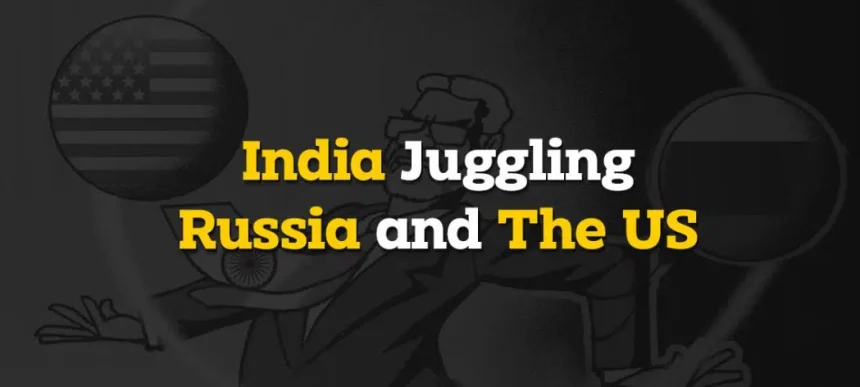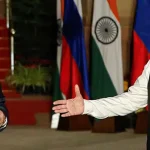India, Pakistan’s historic rival, retained its neutrality in the face of the Russia Ukraine war. India’s presence among the countries that did not support sanctions against Russia for launching an invasion on Ukraine is shocking. India has been and still remains an ally of great importance for the United States. India is the key to containing China in the South Asian region for the superpower.
When asked by the European Union and the United States during the emergency session, conducted by the UN Security Council, to impose sanctions on Russia, India opted to stay neutral. India faced flak from US lawmakers for its decision to not vote against Russia. While this neutrality might seem viable in the current scenario, it could prove to have ghastly consequences for India in the future.
India’s unbiased approach to the current conflict comes from the alliances it has on both sides of the world. While the United States is its most important ally in the West and in countering the Pak-China alliance in the region, Russia is its time-tested partner and the largest supplier of weapons.

India’s dilemma now is whether the Biden administration decides to impose sanctions on its military purchases from Russia. According to the Countering America’s Adversaries Through Sanctions Act, or CAATSA, the American government can impose sanctions on any country that has trade relations with Iran, Russia and Korea. The US can apply financial and economic sanctions if the country under discussion trades with Russia in terms of military equipment. The US has already imposed sanctions on countries for buying S-400. Turkey, a Nato ally, and China have bought the missiles and been sanctioned for it.
The first time the US imposed sanctions on India was back in 1998 under the Clinton administration. The sanctions were imposed after the country’s underground nuclear tests took place, under Glenn Amendment, which states that when a non-nuclear state detonates a nuclear explosive device, certain sanctions are applied to that state. As a result of those sanctions all but humanitarian aid was cut off to India which caused it a loss of an estimated $142 million. In addition to this, the US had also cut off exports of defence technologies and all sorts of international lending via the world bank was opposed. These sanctions were lifted in the years 1999 to 2001 and India was recognised as a legitimate civilian nuclear power and in 2008 it was recognised as a de facto military nuclear power.
India signed a deal with Russia on its S-400 Triumf long-range missile system among the two dozen deals that were signed between the two countries, not to forget the 10-year defence cooperation pact. The pact includes up-gradation of defence cooperation, and facilitation of joint development and production of military equipment, components and spare parts.. Previously there have been no indications that sanctions will be imposed on India, but the current scenario could place India in a difficult spot. The point to ponder here is the current situation of Russia; while it is being imposed with sanctions from all sides, it is quite possible that this deal with India gets sanctioned as well.

The deployment of the first regiment of the S-400s has already begun and will take a few weeks for the process to complete. India will receive five units of S-400 missile defence systems in total under a whopping $5.43 billion deal signed in October 2018. The technology under discussion is capable of neutralizing assets from 400 km away. The system is laden with capabilities such as multifunction radar, autonomous detection and targeting systems, anti-aircraft missile systems, and a command and control centre that is capable of firing three types of missiles to create a layered defence. This up-gradation in India’s military capabilities will augment its artillery strength but at the same time will act to increase security dilemmas in the South Asian region. Keeping in view the region’s fragile security environment and the nuclear-capable neighbour, the situation can become rather frightening. In case this deal skips the US sanctioning regime, it will not only allow the belligerent leadership of India to be able to pursue even more aggressive military strategies against Pakistan, but it will also put a question mark on the credibility of the US laws.
Also Read: A Cyber Conflict Between Russia and Ukraine
Although India is at the curb of attaining some of the finely made defence systems in the world, the deal puts up impediments in the political and military relations between India and United States. The silence of Indian representatives in the UN session was loud enough for the US government and its allies to be disappointed. India also abstained from giving a response in the UN Human Rights Council that decided to establish an independent international commission for inquiry in the wake of Russian aggression against its neighbour Ukraine. India did not condemn Russia’s recognition of the separatist regions of Donetsk and Luhansk. Biden administration might be able to take a less harsh stance on India since it is a member of the Quad among the US, Australia and Japan, making India a very important security partner for Biden. India is also confident that it will get the sanctions waivered due to the strategic convergence between New Delhi and Washington on the Chinese threat.
Russia’s support for India goes way back in history, especially regarding the Kashmir issue. In 1955, Nikita Khrushchev declared his support for Indian sovereignty over Kashmir by saying, “We are so near that if ever you call us from the mountain tops we will appear at your side”. From then on Russia has been a stone wall for India against international intervention in Kashmir. Examples of Russia’s support can be recounted from the years 1957, 1962 and 1971 when the then Soviet Union vetoed the UN Security Council resolutions where it insisted that Kashmir is a bilateral issue between India and Pakistan. Since then India has enjoyed a good relationship with the then Soviet Union or now Russia.

India earned Russia’s support even when Narender Modi decided to revoke article 370 of its constitution that gave Jammu and Kashmir special status; while it had to face criticism from the international community, Russia declared it to be an internal matter for India. Putin’s administration has maintained its support throughout times when India needed it.
India abstaining from taking a stance against Russia was not only shocking for the west and its allies but also for the Ukrainians who were expecting responsible action against their circumstances. The Ukrainian envoy to India expressed dissatisfaction over the Indian response and stated “I am following all the reports from the side of your ministry and the latest advisory to your citizens in Ukraine was just not to go out, not to go to Kyiv, and the statement of your minister of external affairs was that India is closely following the development of events. We are deeply dissatisfied with their positions.”
Also Read: Israel; Preserving neutrality in face of war
While the West aims to cripple Russia economically and has put targeted sanctions on the Putin administration and its oligarchs; some of the sanctions that are imposed are the toughest economic and human-centric sanctions in the history of Russia. For India, the situation is much like being in a rock and hard place with Russia, its strategic and defence partner, on one side and the United States, a partnership that came together in times of need, on the other. In the scenario where the Biden administration decides to impose sanctions on India, its relations with Russia will face immediate and long term effects because of the sanctions. India’s neutrality will also undermine its role in the global world and in Quad, the security block India is a part of and in future will also impact India’s goal to be an important global player. The current conflict has highlighted how India can be an unreliable partner for the Western powers since it prioritised its own national interests over their alliances. It is almost fair that India withholds the condemnation of Russia’s actions as India’s Kashmir is Russia’s Ukraine.






